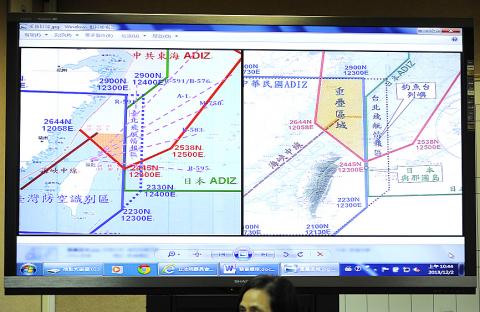Since China announced an air defense identification zone (ADIZ) over the East China Sea, there have been 13 sightings of US military aircraft in the zone and 85 instances of Japanese aircraft entering the zone, a senior military official told lawmakers yesterday.
Deputy Chief of the General Staff for Intelligence Ke Wen-an (柯文安) made the remarks at a meeting of the legislature’s Foreign Affairs and National Defense Committee during which officials were asked to give assessments of the situation following the declaration of the ADIZ on Nov. 23.
The zone includes the Diaoyutai Islands (釣魚台), which are claimed by Taiwan, China and Japan — which calls them the Senkaku Islands. China has demanded that foreign aircraft passing through the zone file flight plans in advance and strictly follow instructions from its air-traffic controllers.

Photo: Chen Chih-chu, Taipei Times
Citing information collected by the military, Ko said China has sent its military aircraft to the area 55 times since it announced the new zone and there were three instances in which the Chinese planes were in close proximity to aircraft from Japan or the US.
The planes were very close to each other, Ko reiterated, when Democratic Progressive Party (DPP) Legislator Hsiao Bi-khim (蕭美琴) asked whether China had intercepted any foreign aircraft in the zone.
Minister of National Defense Yen Ming (嚴明) told the committee that no Chinese military aircraft have entered Taiwan’s ADIZ since Beijing’s Nov. 23 announcement.
Responding to questions from lawmakers on the committee earlier in the day, Civil Aeronautics Administration Director-General Jean Shen (沈啟) said that aircraft from Taiwan had previously been intercepted by Japan’s Air Self-Defense Force in an area where the two countries’ airspace zones overlap.
In 2002, Japanese defense craft “monitored” a Taiwanese plane testing a new air route designated B591, which stretches from Taipei to northeastern China through the overlapping zones, according to CAA official Margaret Hong (洪美雲).
A similar incident occurred in 2009, she said.
Shen said the area falls between longitude 123? and 124? east.
Japan asked Taiwan to provide flight plans through the overlap starting in 2009, and Taiwan has complied, she said.
However, Japanese self-defense planes have intercepted Taiwanese civil aircraft in the region, which “poses a great danger” to Taiwan’s flight control, she said.
Hsiao said interference from Japanese fighter planes can seriously impact the safety of Taiwan’s civil aircraft on normal flight routes.
Hong told reporters after the hearing that “interception” is a military term meaning that the Japanese fighter was dispatched to “learn about the situation” and she did not know how close the two planes had come to one another.
Additional reporting by Rich Chang

SECURITY: As China is ‘reshaping’ Hong Kong’s population, Taiwan must raise the eligibility threshold for applications from Hong Kongers, Chiu Chui-cheng said When Hong Kong and Macau citizens apply for residency in Taiwan, it would be under a new category that includes a “national security observation period,” Mainland Affairs Council (MAC) Minister Chiu Chui-cheng (邱垂正) said yesterday. President William Lai (賴清德) on March 13 announced 17 strategies to counter China’s aggression toward Taiwan, including incorporating national security considerations into the review process for residency applications from Hong Kong and Macau citizens. The situation in Hong Kong is constantly changing, Chiu said to media yesterday on the sidelines of the Taipei Technology Run hosted by the Taipei Neihu Technology Park Development Association. With

CARROT AND STICK: While unrelenting in its military threats, China attracted nearly 40,000 Taiwanese to over 400 business events last year Nearly 40,000 Taiwanese last year joined industry events in China, such as conferences and trade fairs, supported by the Chinese government, a study showed yesterday, as Beijing ramps up a charm offensive toward Taipei alongside military pressure. China has long taken a carrot-and-stick approach to Taiwan, threatening it with the prospect of military action while reaching out to those it believes are amenable to Beijing’s point of view. Taiwanese security officials are wary of what they see as Beijing’s influence campaigns to sway public opinion after Taipei and Beijing gradually resumed travel links halted by the COVID-19 pandemic, but the scale of

A US Marine Corps regiment equipped with Naval Strike Missiles (NSM) is set to participate in the upcoming Balikatan 25 exercise in the Luzon Strait, marking the system’s first-ever deployment in the Philippines. US and Philippine officials have separately confirmed that the Navy Marine Expeditionary Ship Interdiction System (NMESIS) — the mobile launch platform for the Naval Strike Missile — would take part in the joint exercise. The missiles are being deployed to “a strategic first island chain chokepoint” in the waters between Taiwan proper and the Philippines, US-based Naval News reported. “The Luzon Strait and Bashi Channel represent a critical access

Pope Francis is be laid to rest on Saturday after lying in state for three days in St Peter’s Basilica, where the faithful are expected to flock to pay their respects to history’s first Latin American pontiff. The cardinals met yesterday in the Vatican’s synod hall to chart the next steps before a conclave begins to choose Francis’ successor, as condolences poured in from around the world. According to current norms, the conclave must begin between May 5 and 10. The cardinals set the funeral for Saturday at 10am in St Peter’s Square, to be celebrated by the dean of the College